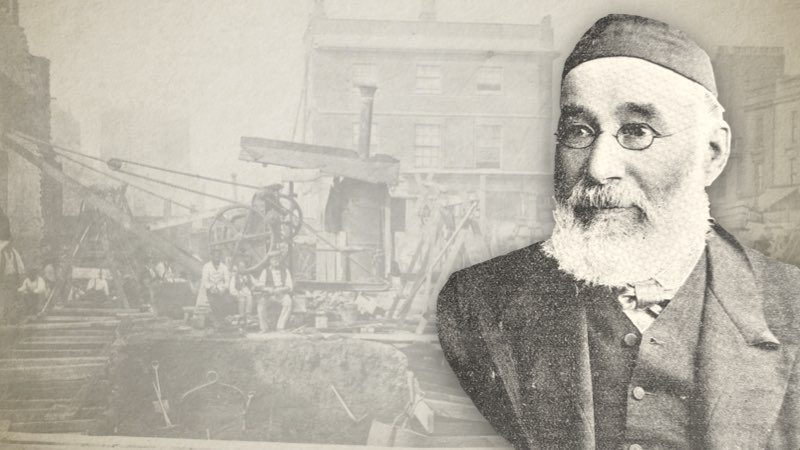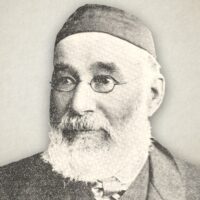
The Life And Ministry Of John Woodward
Earthen Vessel 1900:
Our dear departed Brother, Mr. John Woodward, whose portrait is given with the present issue, was one of the few unassuming and reticent Christians who are better known by deeds than words. The writer of this sketch did not have the privilege of a long acquaintance with him (about eight years at most), but it was long and close enough to discover that the Spirit of Christ dwelt and operated in our Brother in no mean degree, and now that he has gone to his eternal rest, sweet memories of kindly deeds are recounted by those who have benefited by them, which disclose the principles that actuated them to be of Divine origin. It appears that the Lord began a work of grace in him in very early life—how early is not known, but the testimony of his own lips was that when about twelve years of age, he was entering into a new sphere of life, he kneeled in his chamber and earnestly besought the Lord to bless him in what he was about to do, and at the same time promising that if He would condescend to prosper the work of his hands, he would seek to do good to His cause and people; and subsequent events have proved how he has been enabled to fulfil that compact. He was almost, if not quite, a life-long total abstainer from intoxicating drink, and was wont to consider that to be one great factor in the means used by God in giving him prosperity in business, which he commenced as a master builder in the City of London about the year 1849.
He married in 1850 a true helpmeet in the lady who still survives him; and for about fifteen years they attended the ministry of the late Mr. James Wells at the Surrey Tabernacle, Borough Road. Meantime, his business in the city expanded, and he commenced building his property in Canning Road, Croydon, and removed there in 1866, where he resided until the end of his life. There were at that time two godly ministers in Croydon, viz., the late F. Covell, and the late J. C. Thurston, and our brother and his family heard these good brethren alternately for a time, when it was impressed upon his mind that it would be right and best to make a home with one or the other of them, and after consultation with his wife concerning it, they came to the decision to sit under the ministry of Mr. Thurston, for whose ministry the Baptist Chapel in Tamworth Road was built in the same year. Some few years after this Mr. Thurston resigned that pastorate, many of his friends removing with him, our departed brother among them, and worshipped in a hall for a time. Our brother at once purchased the site and erected the Chapel and School in Derby Road, which he very generously and mainly supported as long he lived, holding the office of Treasurer, and making the balance of the accounts always come out on the right side, both for Church and School.
In August, 1898, he had a slight paralytic seizure, from the effects of which he never fully recovered, and which caused him to relinquish his office as Treasurer, and retire from the active part he had taken in the conduct of affairs; not, however, until he had, at his own entire cost, put the chapel and school in thorough repair, with new ventilating and heating apparatus; and added a codicil to his will, in which he bequeathed a substantial yearly sum for four years after his death, for the help of the cause so dear to him at Derby Road. He was the subject of another seizure on January 6th, 1900, rendering him speechless, and from which he never rallied, falling asleep in Jesus, on January 11th, to be for ever with the Lord. His remains were interred in the cemetery of his native town (Margate), on January 16th, with every sign of respect. The Mayor and Corporation meeting the funeral cortege at the railway station, and following it to the grave in which we left the body of our dear departed brother, in sure and certain hope of a joyful resurrection to eternal life; the writer conducting the funeral service.
Our departed brother’s Christianity was not by any means a superficial one; there were times when he could, and did tell, of deep and abiding teaching, received in the school of heavy affliction. He knew somewhat of the chastening of the Lord, and by it he had been preserved from trusting in mere external routine, and brought into living, loving, and lasting communion with Him, which enabled him to testify of goodness and mercy given, deliverances wrought, and gracious satisfaction felt with the Lord’s dealings with him, both in grace and providence. His life was fruitful in generous giving to the pecuniary aid of many of our Churches and Societies, but these did not by any means compass our dear brother’s generosity; the widow’s heart has been made to sing for joy, and orphans have been fed and clothed, and in many other cases help has been rendered, the record of which has only been made by Him who said, “Inasmuch as ye have done it unto one of the least of these My brethren, ye have done it unto Me.”
Our dear brother had entered his 77th year, had “served his generation by the will of God” well, and now “rests from his labours, and his works do follow him.”
The Churches and many individuals have lost a true friend,—the Church at Derby Road especially so. His memory will be blessed, like that of the just. Our prayer is that our bereaved sister may be sustained and cheered by our God and Father during the remainder of her pilgrimage; and that others may be stirred up to carry on the work that our brother has laid down, after doing his part to the glory of God so nobly and so well.
“Methinks I see him now at rest,
In the bright mansion Love ordained,
His head reclined on Jesu’s breast,
No more by sin and sorrow pained.”
Ebenezer Beecher
A Letter
Dear Mr. Mitchell,—As one having some personal and intimate knowledge of Mr. Woodward, now “at home with the Lord,”—I am gratified to learn by this month’s Earthen Vessel & Gospel Herald, that you intend giving a portrait and an account of this exceedingly liberal man. During my pastorate at Derby Road, I was again and again deeply impressed with his liberality, aye, and a happy recipient of it. Frequently, when unable himself to attend a meeting held in the neighbourhood, be would give me £3 to pay in the plate for him. Individuals also, many have received help from him—help which has lifted a load of care off them. Here is a typical case:—
A member of the Church at Derby Road, a widow, in a small way of business, was very ill. She thought she was dying, and sent for me to make her will, and desired I would be her executor. She said at that time, “I have one great burden on my mind; when in business difficulties I borrowed £40 from Mr. Woodward, and I have never been able to repay him. When you dispose of my stock be sure you return him the £40.” I went to Mr. Woodward, and informed him of her burden. “Oh!” he answered, “I gave it her. I ought to have told her so at the time. I never expected it back.” He afterwards saw her and assured her of this. She recovered, and received again and again substantial help from her friend before she went home.
J. Copeland
Reading, Feb. 5th, 1900
John Woodward (1813-1890) was a successful businessman aligned with the teachings of the Strict and Particular Baptists. In 1849, he commenced work in the City of London as a master builder. He was married the following year, after which he and his family sat under the gospel ministry of James Wells at the Surrey Tabernacle, Borough Road. In 1866, he built a family house on Canning Road, Croydon, where he resided the remainder of his life. It was then he came under the gospel ministry of Mr. Thurston, eventually purchasing the site and erecting the Chapel and School on Derby Road. What the gospel ministers set forth in words, Mr. Woodward preached in works. Truly it may well have been said of him, “I know thy works, and charity, and service, and faith, and thy patience, and thy works; and the last to be more than the first.”



